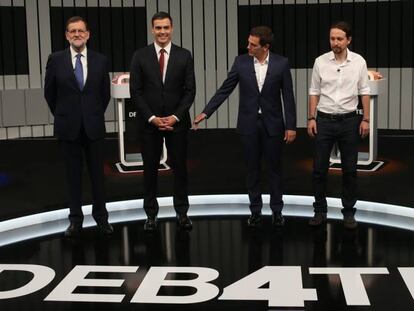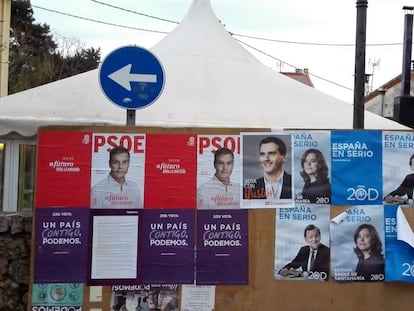Pablo Iglesias: “After I am prime minister, I will walk away from politics”
In this extensive interview with EL PAÍS ahead of the June 26 elections, the leader of Podemos addresses doubts regarding his plans for Spain
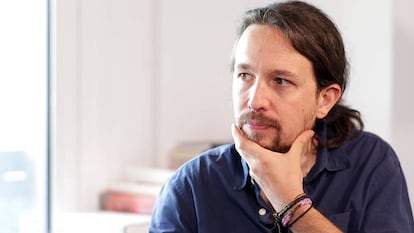
Pablo Iglesias’ office, located on Madrid’s Princesa street, seems more suited to an administrative assistant than to the secretary general of Podemos, Spain’s second party according to the latest opinion polls. It is unclear whether he’s just moved in – it’s almost as though the provisional look of this place were an allegory for his own political situation. Iglesias is a leader in a state of flux who heads a party of morphing ideology.
His goal is to win the general election of June 26, and so far, polling data suggests he has already established his party as the dominant force within Spain’s political left.
Face to face with him, Pablo Iglesias is an engaging speaker who never loses his calm and never hesitates before replying. He seems to have interiorized the party’s rhetoric, including its newer elements and its contradictions. His own office illustrates the point: there is a poster of Che Guevara, a painting of Khaleesi from Game of Thrones, a biography of Latin American independence hero Simón Bolívar, and another biography of Juan Carlos, father of current monarch Felipe VI and an instrumental figure during the country’s democratic transition. There is also a magazine with former Socialist leader Felipe González on its cover.
Question. The Podemos campaign poster looks a bit like something out of Star Wars or a Spielberg movie, don’t you think?
Answer. A little, yes.
Podemos has already contributed to structural changes in Spain, and that’s without even coming close to government. Imagine when we do...
Q. And one gets the feeling that you are like the Sun, with everyone else gravitating around you. How much weight does Pablo Iglesias’s charisma carry within Podemos?
A. Fortunately, my charisma counts for less and less within Podemos. We’re an organization born with a handicap: it depended too much on knowledge of me. At the European elections [of May 2014] we conducted a survey that showed that people knew very little about Podemos and a lot about me. And that forced us to make the unpleasant decision to use my face on the ballot. Fortunately, we now have a shared leadership and there are enough team members so that Unidos Podemos can display its various nuances and show its many faces.
Q. Could Podemos survive without Pablo Iglesias?
A. Absolutely, absolutely. The fact that I am dispensable is the best news for Podemos.
Q. Are you considering stepping down once the party is in orbit?
A. Yes, for two reasons: because politics is temporary and because one should always be ready to do the organization’s bidding. I am under constant evaluation and I am ready to stop the moment I am told to. I want to be prime minister, and that involves an availability of four to eight years, but that can also be reviewed.
Q. Do you have any desire to be the leader of the opposition?
A. I would rather be the head of government. Being opposition leader would mean the Socialist Party (PSOE) has helped reinstate [Popular Party leader] Mariano Rajoy. And that would be bad news.
Q. Is that the most likely scenario?
A. I prefer to think not. I want to believe that the PSOE will not abstain to help Rajoy at the investiture vote, among other reasons because Socialist voters wouldn’t forgive that.
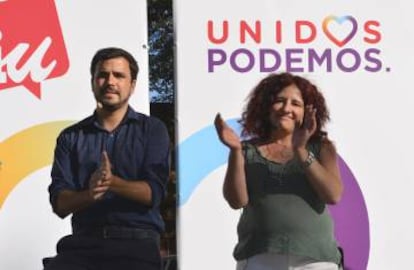
Q. But why would the PSOE help put you in office instead, if it didn’t strike a deal with you back when Socialist candidate Pedro Sánchez could have been prime minister himself?
A. They are at a crossroads: they are in the middle of a historical debate and they have two options. Either they reach a deal with the PP, or they reach one with Podemos. They already tried an alliance [with Ciudadanos] that didn’t make up the numbers. And now they are faced with the same decision again. There is a new social democratic space that has to be built, but we cannot build it alone. We need to do it with the Socialist Party and what it stands for. Whatever happens on June 26, they will continue to be a fundamental party in Spain.
Q. So are you debunking the paradoxical theory that goes that the modern Pablo Iglesias could kill the party that was founded by the original Pablo Iglesias in 1879?
A. Anybody who says that doesn’t understand Spain. In politics, it is essential to understand the makeup of forces. We cannot do it without the Socialist Party. We are already in power in Spain’s main cities thanks to them, and I think it’s good for the PSOE to take on this kind of collaborative role.
Sign up for our newsletter
EL PAÍS English Edition has launched a weekly newsletter. Sign up today to receive a selection of our best stories in your inbox every Saturday morning. For full details about how to subscribe, click here.
Q. Yet to the untrained eye, there is no sign of mutual understanding. One would think that all bridges between the PSOE and Podemos have been burnt.
A. We need to think forward and about the balance of forces. There’s been some unfortunate statements – on my part as well. I understand Pedro Sánchez’s harsh tone during this campaign run, but I think that after June 26 things will have to relax. We will need to talk about Spain. If they opt for the PP, they’ll be making a serious mistake.
Q. Since you are admitting to mistakes, what would yours be?
A. Sometimes I’ve been too harsh in my tone. There are things that don’t need to be repeated once they’ve been said. I am thinking about quicklime [alluding to the dirty war against ETA in the 1980s]. I think it was fair to mention it in the speech, but it was a mistake to repeat it in the debate. And sometimes, I guess the dynamics of parliamentary aggressiveness drew me like a magnet. Being in politics is also about maturing. You have to be like [Muhammad] Ali in the ring: float like a butterfly and sting like a bee.
Q. Does maturing mean mutating? A lot of people are really disconcerted about Podemos’ ideological position, about this journey from communism to social democracy in a matter of months. Where does Podemos really stand?
A. Since 2014 I have always said that we have a social democratic program. In the 1970s, European communism incorporated key elements of social democracy, which has its roots in Scandinavian countries. The weight of neoliberalism in the 1980s and 1990s pushed social democracy towards what Tony Blair called the Third Way. They ended up being absorbed by the conservative parties, which defend dogmatism in economic policy. This open space has made it possible for political forces such as ours to emerge. We are the result of the failure of the Third Way.
Q. Podemos’s latest discrepancy was its abstention at the vote asking for the release of political prisoners in Venezuela. Why did you not vote in favor?
A. We proposed several amendments which were all turned down. We defend mediation, UNASUR’s position, even some statements by the foreign minister and the role played by [former Spanish prime minister José Luis] Rodríguez Zapatero. But don’t count on us to support those who are trying to use Venezuela as a campaigning tool back in Spain.
There is a new social democratic space that has got to be built, but we cannot build it alone. We need to do it with the Socialist Party and what it stands for
Q. Why has Pablo Iglesias not been back to Venezuela?
A. I was only there three times in my life: in 2006 and 2007 to give some lectures, and then for a month in 2011, and that was it.
Q. Do you want to put some distance between yourself and the chavista sympathies that Podemos is believed to harbor?
A. We have said very clearly that we don’t like the situation in that country. The Venezuelan government has made many mistakes involving the confrontation between the legislative and the executive. We share that feeling of disappointment with regard to chavismo, which was a source of hope at first.
Q. What do you admire about Mariano Rajoy?
A. He is a sarcastic guy who performs well at the podium and I think he’s got a lot of experience.
Q. What do you admire about Pedro Sánchez?
A. He is tremendously friendly. And that’s important. And he’s made great efforts to change things within the PSOE.
Q. What do you admire about Ciudadanos leader Albert Rivera?
A. He is enormously astute and clever. He is in charge of a party with very little weight, and what he has achieved is truly impressive.
Q. What don’t you like about Pablo Iglesias?
A. Sometimes my spontaneity plays tricks on me. There are times when it pays to be more self-contained. I am learning.
Q. Have you ever lied in politics?
A. I don’t think so. And I pay for it. A lot of advisors have told me that sometimes it is better not to tell the truth, but I don’t want to stop being who I am.
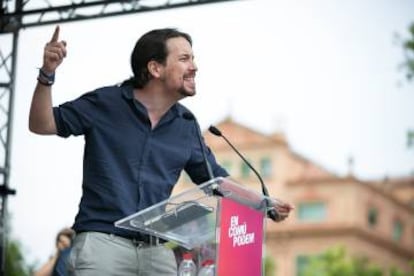
Q. What is the worst part about your experience in politics?
A. Not having the time to do the things I like. I used to read a lot more. And I was anonymous enough that I could go out for a beer or with friends. But this is an incredible journey. Because of my training in the social sciences, to study history is fascinating, but to be making it is even more fascinating.
Q. In between recent statements about the death of social democracy and the non-existence of communism, we find that Podemos is now a social democratic party that has married a proud Communist in order to create Unidos Podemos, your alliance with the United Left. Can you clear up this contradiction?
A. I understand the need for labels and the chest-pounding, but historical context is important too. Ever since the 1970s, Western communism’s platforms have been social democratic in nature. There are a lot of coincidences between us, and that is why there is common ground.
Q. Don’t you think that your affinity for Pope Francis links you to a policy of gestures, words and good intentions, but of few facts on the ground? There have been no real changes in the Vatican beyond superficial ones. Does Podemos run the same risk?
A. I strongly believe in the ability of language to help bring about change, and much more so when the speaker is the head of the Catholic Church. What the Pope says automatically creates a reality. And it’s the same in politics. Podemos has already contributed to structural change in Spain, and that’s without even coming close to government. Imagine when we do...
Q. Isn’t there a contradiction in defending sovereign europeanism outside our borders and a plurinational patriotism back home?
A. There isn’t. They are perfectly compatible. We are patriots, but we are not France, we are not a Jacobin country conceived out of a single language and a single culture. Spain is a plurinational and a diverse reality, and this needs an institutional way out. It’s the people that make the homeland, not the symbols. Sovereign europeanism means maintaining the passion for a common Europe while democratizing its institutions. We are profoundly pro-European. And in Spain, we represent a barrier to movements like France’s extreme right, which foments euroskepticism.
Q. Where do you see yourself 10 years from now?
A. I see myself as a lecturer in class, which is what I am passionate about. I’ve been very lucky, I’ve been paid to do what I like: studying and teaching. And I would like to clown around on television. After I am prime minister, I will walk away from politics.
Q. So you see yourself as prime minister?
A. Yes, yes.
English version by Susana Urra.
